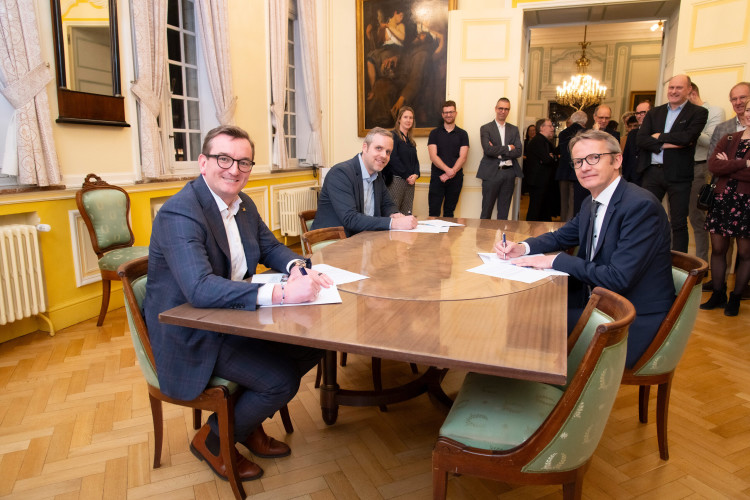QbD Chair for Precision Oncology Research in Glioblastoma extended for three years
The QbD Chair supports the research of Professor Frederik De Smet on glioblastoma, an aggressive form of brain cancer. Behind the establishment of this chair lies a personal story.

The personal story of the QbD Chair
Frederik De Smet, along with his two close friends, Bart Van Acker and Pieter Van Vlierberghe, studied bioengineering together. Bart founded the company QbD (Quality by Design), a consulting firm in life sciences. Frederik and Pieter became cancer researchers, one at KU Leuven and the other at UGent. Pieter specialized in pediatric leukemia and excelled in his field. A few years ago, he himself was diagnosed with an aggressive brain tumor, which proved fatal at the end of 2022. He was only 42 years old.
When Pieter received the diagnosis, he reached out to his former classmate Frederik, who was conducting research in his lab on better treatments for glioblastoma. Pieter and Frederik decided to collaborate and asked Bart Van Acker if he would financially support that research. And so, the ball started rolling. Unfortunately, Pieter did not benefit from the research himself, although he hoped that others after him would have better chances of recovery.
Frederik De Smet and his research team are working on making that hope a reality, supported by the QbD chair. After an initial three-year term, QbD decided to extend the chair for another three years. This extension was celebrated on January 11, 2024.
"The idea of the chair came from Pieter, but we at QbD did not hesitate to say yes. At the QbD Group, we support various social projects through our foundation. This chair is by far the largest project and holds a special place due to my personal connection with Pieter. He brought me and Frederik back together." - Bart Van Acker, CEO QbD Group
The road to a successful treatment for aggressive brain tumors
The extension of the chair is a blessing for the research, which is a long-term endeavor. Glioblastoma is one of the most challenging forms of cancer to treat, with a survival rate of less than five percent over five years, despite intensive standard therapy. The harsh reality is that almost all clinical trials in the past twenty years have failed, attributed to the wide variety of patients and the heterogeneous nature of each individual tumor. This is why the financial boost from this chair is so crucial, says Frederik De Smet:
“Patronage allows us to develop new ideas and think outside the box. We use it to hire a doctoral student who explores avenues for which we do not receive research funding elsewhere.” The data generated by his team serves as a lever to win larger project grants. De Smet adds, “With the research data from the first term, we recently secured a large European grant of 12 million euros. We want to build on that momentum to bring better treatments for glioblastoma within reach.”
